In the last week of September, ForskarFredag, Sweden’s Researchers’ Night, brought science to life in over half of the country’s municipalities. With more than 25,000 people taking part, the event offered opportunities to dive into the wonders of science and engage with hundreds of researchers in fun and interactive ways.
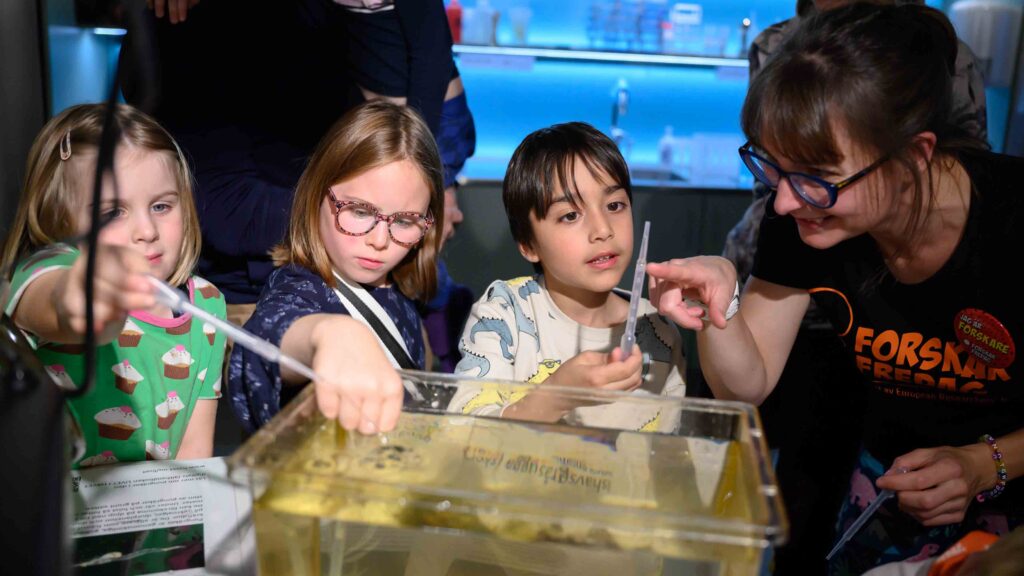
This year’s science festival offered an action-packed programme with over 100 activities spread across 26 locations in Sweden, alongside a number of online events. Participants had the chance to immerse themselves in interactive art, delve into the secrets of non-verbal communication, hunt for clues in a research quiz, explore the world of AI, join a forest party, and, of course, take part in exciting discussions, workshops, and hands-on experiments.
Join us as we take a whistlestop tour of this year’s ForskarFredag, part of European Researchers Night.
Personal pathways to the profession
At Navet Science Centre in Borås, 160 upper secondary pupils gathered for some ‘myth busting’ about researchers. The pupils spent the day engaging in hands-on experiments and meeting researchers from the University of Borås and Chalmers University of Technology.
“Showing young people how research works and what researchers do is an important democratic responsibility. For many, this is their first encounter with higher education, and if we can inspire them to pursue further studies, that’s a wonderful bonus,” says Lina Färm, project manager for ForskarFredag at the University of Borås.
On stage, researchers also shared their journeys into the profession, which were often not as straightforward as one might expect.
“The first time I visited the headmaster for misbehaving and not wanting to go to school was when I was seven,” began David Eriksson, who is now a professor of industrial economics.
Research in everyday life
In Gävle, PhD student Julian Strömqvist focused on this year’s theme ”Research in our everyday lives” and invited year 6 pupils visiting the University of Gävle to think about how pancakes and industrial economics are connected.
”The idea was to show research in everyday life, and since my field is industrial economics, I had them visualise logistical flows by ’making pancakes.'”
The pupils worked in groups, first arranging pre-written cards with different steps for making pancakes in the order they would choose if making pancakes at home for their family. After creating their flowcharts, they shared their steps, sequence, estimated time, and finally explained the entire process.
Next, the pupils adjusted the steps to find ways to make the process as efficient as possible and discussed whether these changes would still result in tasty pancakes. The final challenge was to consider what would be needed to produce pancakes for an entire school.
”The pupils then began asking if it was okay to buy ready-made pancakes and heat them up! It was fun because I wanted to use a context that they could relate to in order to break down complex and abstract concepts into a process they could understand. The pupils then suggested their own ways to improve the process,” says Julian Strömqvist.
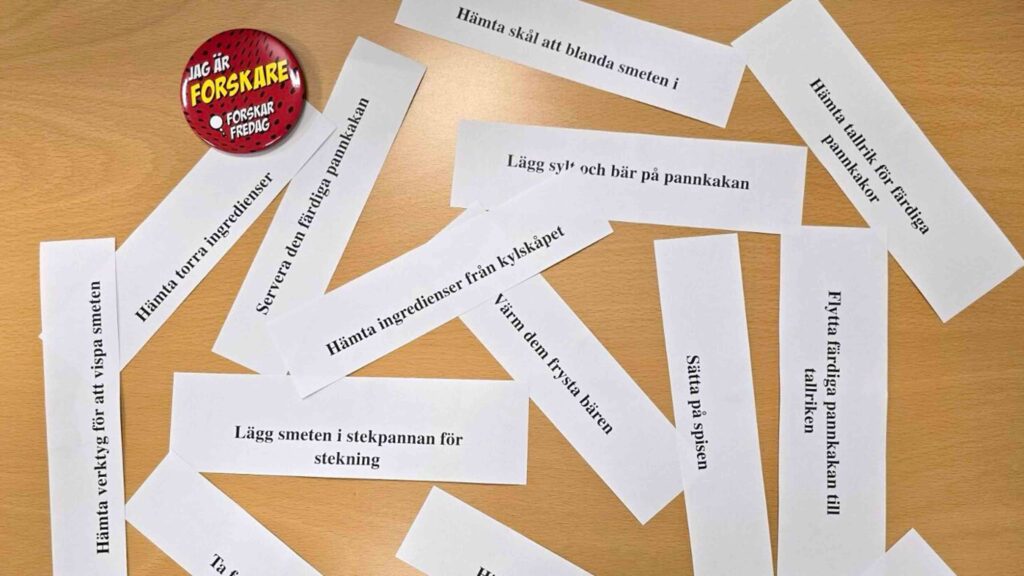
Young people experience what it’s like to be older
Hur vardagen kan kännas när vi blir äldre, var en av de aktiviteter gymnasieklasser kunde prova under ForskarFredag i Skövde. På Skaraborgs Hälsoteknikcentrum fick eleverna testa dräkter som skulle ge en förkroppsligad känsla av att ha en åldrad kropp, som tyngdvästar, elektrodförsedda handskar som simulerade parkinssondarrningar och domningar, glasögon som försämrade synen, och hörselkåpor för att försämra hörseln.
One of the activities upper secondary classes could try during ForskarFredag in Skövde was experiencing how daily life feels as we age. At Skaraborg’s Health Technology Centre, pupils had the chance to test suits designed to give them a bodily experience of an aged body, including weighted vests, gloves with electrodes simulating Parkinson’s tremors and numbness, glasses that impaired vision, and ear protectors that reduced hearing.
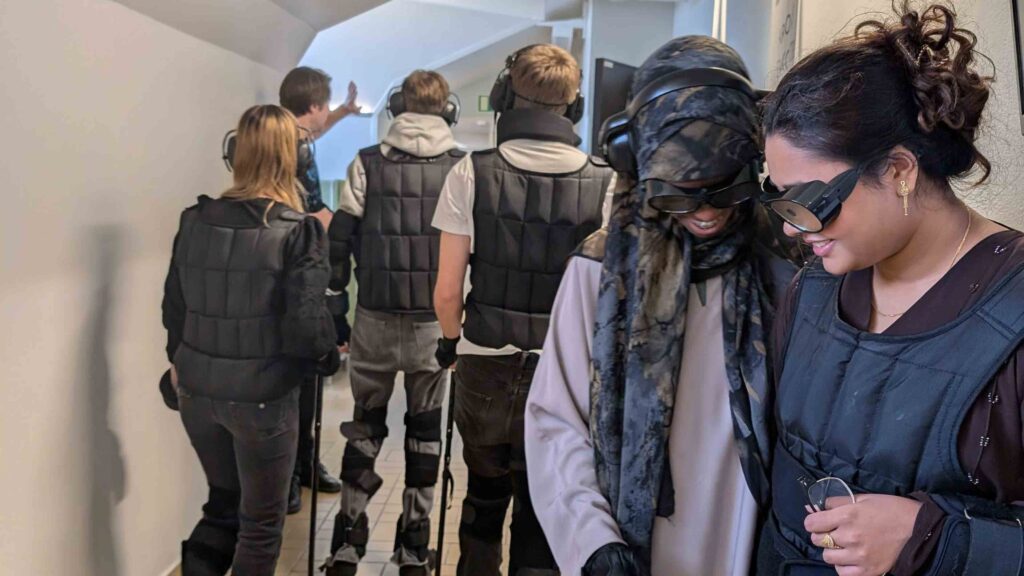
And elderly discussed their reality
Meanwhile, a science café held at Vattenhallen Science Centre in Lund invited older adults to share their perspectives on mental health within their own age group. Researchers Carina Tordai and Håkan Jönson spoke about the positive effects of social meeting places and emphasised the importance of recognising older adults, both in research and in society, as more than just ”elderly.”
“You don’t lose your identity as you age; you must be treated for who you are in all your complexity, even as an older person,” said Håkan Jönson. Read more about the science café here.
From morning to late evening
During the first ForskarFredag to held at the newly opened Campus Helsingborg, eight researchers showcased their ongoing projects to curious visitors from morning to late into the evening. Some of the questions that arose included whether robots have feelings, if people are truly as rational as they seem, how VR can be used to research safety, why we use so much water, and what it’s really like to study at university.
In Piteå, a family day was held where younger visitors could watch the experiment-filled theatre performance Mother Troll’s Magical Glasses. The audience was left to ponder whether magic, illusion, or chemistry was responsible for the glasses suddenly changing colour.
In numerous places across the country, including Östersund, Borlänge, Norrköping, Sundsvall, and Stenungsung, the week ended with the chance to meet researchers during science after work events.
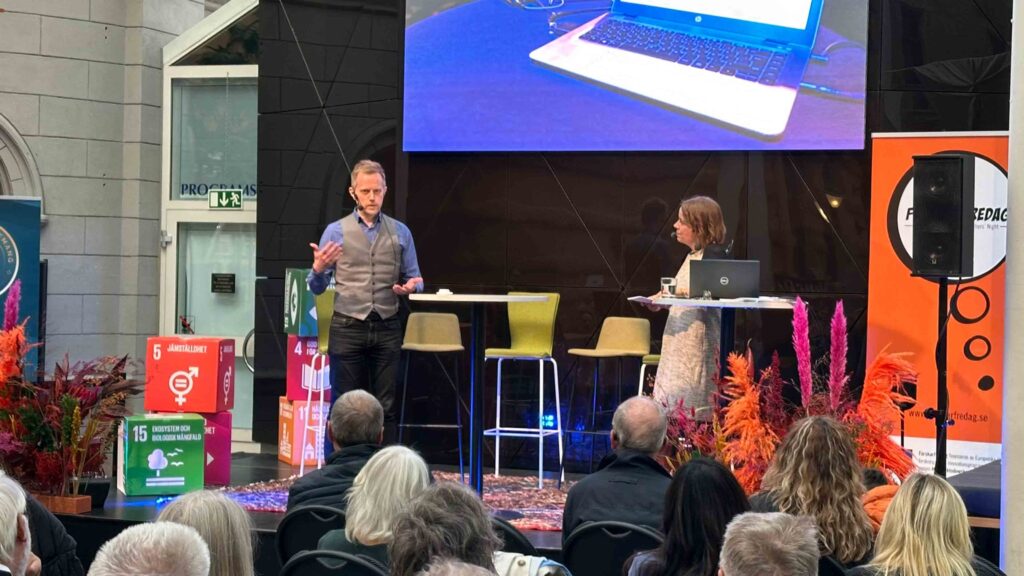
”I wanted to show that research is a broad and real profession”
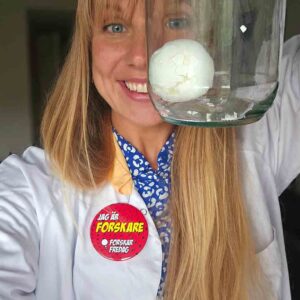
From Monday to Thursday, it was also possible for schools to ”borrow” researchers to visit their classroom. Brain researcher Ida Pesämaa met with 25 classes across the country, both in person and online. The pupils ranged from year 3 primary school pupils to adults attending adult education institutions. Ida Pesämaa explains that the meetings were highly rewarding, not only in terms of positive feedback but also a wealth of curious questions about the brain and life as a researcher.
During the visits, Ida Pesämaa alternated between short presentations and hands-on exercises for the pupils to try.
”When meeting the younger pupils, I had jars with eggs (to represent brains) and they were asked to shake the jars to observe what happened to the egg, and whether there was a difference depending on whether it was in liquid or not. The pupils, whether they were 8 or 13 years old, really enjoyed this activity.”
To show how differently our brains function, I asked older pupils to draw an analogue clock, and also imagine the concept of a year.
One of the driving forces behind ”borrow a researcher” is to show that being a researcher can mean many different things.
“I wanted to show that research is a broad and real profession, rather than something you only see in films, usually in the form of a ‘mad professor.’ It was also important for me to show that I don’t know everything, and that it’s perfectly okay to answer a question with ‘Good question, I don’t know.’”
“I wanted to take away the pressure and stress around how children/young people are expected to learn, and instead inspire them to think for themselves about the subject and formulate their own questions that interest them,” says Ida Pesämaa, who works at the University of Gothenburg.
250 classes borrowed researchers
During ForskarFredag week, 60 researchers (listed in ForskarFredag’s Hall of Fame) were ‘borrowed’ by a total of 250 classes, from Kiruna in the north to Nairobi in the south. In the evaluation following the visits, many pupils reported that the meetings had given them a broader understanding of what researchers do and who they are:
- “It really gave me a broader perspective on how vast and wide-ranging research truly is. You can really research anything, and there is always more to research!” Pupil aged 16.
- “I take away the feeling that being a researcher is really fun.” Pupil aged 12.
- “Face to face, researchers are more than just people who know everything; they are people who have worked hard to get to where they are now. It’s motivating to realise that everyone starts somewhere, and research is something that most people can learn from or even become researchers themselves.” Pupil aged 18.
- “I’m taking away knowledge about the research profession. I didn’t really know before that being a researcher was a profession.” Pupil aged 17.
Borrow a Researcher will return in April next year, as well as during ForskarFredag, which will be celebrated from 22-27 September 2025.
ForskarFredag is part of the European collaboration European Researchers’ Night and Researchers at Schools. This year, Researchers’ Night activities were run in 25 countries and expected to have reached over 2 million people.
The ForskarFredag 2024 science festival was carried out with support from the Carl Tryggers Foundation; the Royal Swedish Academy of Letters, History and Antiquities; the Oscar and Maria Ekman Donation Fund; SULF – the Swedish Association of University Teachers and Researchers; the Wennergren Foundations; Naturvetarna; the Swedish Research Council; Åforsk; and the EU’s research and innovation programme Horizon Europe through Marie Skłodowska-Curie Actions, GA 101162306.
